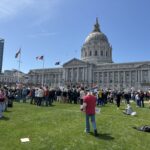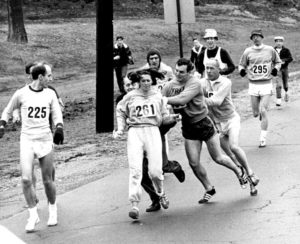Students in Mr. Lopez’s Popular Culture and Global Politics were asked to identify songs that either reflected, initiated, or supported a resistance movement of one kind or another. This might be resistance against the formal expression of power (against policies, institutions, governments, armies, etc) or against more informal expressions of power (for example, racism, gender discrimination, etc…). Here’s what they came up with—we hope you enjoy. This will be posted in two installments, on May 15th and May 22 respectively.
- Solenn Grainger-Monson – Chilean Rapper and Singer Ana Tijoux creates highly politicized music as empowerment for indigenous Latin American Culture. Her song, “Somos Sur,” is a collaboration with Arabic Hip Hop Artist Shadia Mansour, and sends a message of pride and resistance for the Southern Hemisphere.
-
Amelia Levin-Sheffield – Turkey’s biggest pop-star, Tarkan, is best known for his internationally successful hit single Simarik or Kiss Kiss. The song celebrates a modern Turkish women, as well as a broader gender spectrum. Tarkan’s own ambiguous sexual orientation, along with his often controversial music, has long incited a national debate in Turkey, calling into question traditional gender norms and the way in which the LGBTQ community is treated.
-
Ryan Kearns – Russian Folk Bard Bulat Okudzhava’s “The Paper Soldier,” a solemn ballad about the meaningless death of a naive soldier, was spread via uncensored tape recorders in the Post-Stalin Soviet Union, challenging both the media autocracy and the legitimacy of their militant nature.
-
Chloe David – Keny Arkana, a French rapper who is of Argentinian descent, uses her rap to spread her political views, especially those on terrorism and counter-terrorism in France. Arkana feels that the French government is highly hypocritical and wants to allow the public to see the two-sidedness of the war on terror.
-
Camielle Opperisano – Songs that are for the public of Iran need to be approved by the Ministry of Culture and Guidance. The song “Drunk Shah, Drunk Elder” by Salome MC was produced illegally to highlight the issues with the control of the clerical elite in Iran by discussing the similarities between the oppression of the Shah before the Iranian revolution and the autocratic rule that is present in Iran today. Salome MC is already very influential because being the first female rap artist in Iran has a political impact in itself as a resistance from the Iranian government.
-
Leila Shokat – In October 1988 in Algeria, riots broke out among younger generations as a result of years of underemployment, poverty, and inflation. These riots coincided with the release of a song called “El Harba Wayne?” (To Flee, But Where?) by a famous rai musician Cheb Khaled. The song talked about the struggle of Algerian youth, and resonated with the rioters, uniting them and becoming their protest anthem.
-
Daniel Holzman – Immigrant Punk, by the international Gypsy-punk band Gogol Bordello is a celebration of the communal experience of immigrants in the face of assimilation.
-
Maya Rich – Zog nit keynmol az du geyst dem letstn veg was written by a young Jewish man named Hirsh Glik while he was interned at the Vilna concentration camp. The song was adopted by the Jewish Partisan movement as an anthem that inspired “defiant optimism” among the resistance. Today, it is sung at Holocaust remembrance ceremonies to honor martyred partisans as well as the spirit that defied Nazi terror.
-
Alonzo Trujillo – “El Eligido” by Silvio Rodriquez is a song tells a story about a being from another galaxy that some believe is in reference to Ernesto “Che” Guevara. It describes how this being came to understand that material things are not important and fighting for the rights of others is. The song justifies that war is sometimes the solution to find peace in the future.
-
Jill Reilly – The current South African national anthem is the combination of the black South African hymn “Nkosi Sikelel’ iAfrika” (“God Bless Africa”), which was adopted by the anti-apartheid movement, and the Afrikaner melody “Die Stem van Suid Afrika” (“The Call of South Africa”), which acted as the country’s official anthem from 1957 to 1994. The two songs were officially merged in 1997, three years after the election of Nelson Mandela – the first black South African president – as a call for peaceful coexistence among black, coloured (mixed race), and white South Africans following the end of apartheid.
-
Kiera Collins – Calle 13, a politically vocal Reggaeton group from Puerto Rico shape cultural and national imaginaries in their 2011 song “Latinoámerica” which addresses the marginalization and struggles of Latin Americans after a history of colonization. The song also speaks of the strength of Latin America and paves the way for a cultural revolution based on a collective pan-Latino national identity.
-
Oliver Mancini – Rodriguez was able to change the political course of a nation across the globe without knowing it ever happened. After reaching Elvis-level fame, Rodriguez’s music helped persuade and inspire young white South Africans to join the anti-apartheid movement.
-
Bennett Schneider“War” by Bob Marley is a powerful song about postcolonial racism and the constant fight for equality. Marley emphasizes that this struggle is universal, even if not in a postcolonial country.
-
Jonah Gerard-Grossman – “Gimme Hope Jo’Anna” gained popularity through the song’s infectious rhythm as well as the previous fame of the artist, Eddy Grant. This popularity allowed the song’s piercing Anti-Apartheid lyrics not only to inspire those oppressed in South Africa, but also to reach a large international audience, spreading awareness of the issue.
-
George Dicke – A feminist punk rock group, Pussy Riot, performed a punk prayer at a cathedral in Moscow protesting Putin, his connection to the church and other issues regarding Russian society prior to the 2012 Russian presidential. Two of the band members were sentenced to two years in jail on hooliganism, a verdict that drew criticism from across the globe. Pussy Riot may have revealed injustices and highlighted repression in Putin’s Russia, but their punk prayer only began the conversation on personal freedoms, faith and justice.
-
Bonnie Castleman – With his song “Rais Lebled”, El Général embodied the rebellious and transformative attitudes often found in hip-hop. El Général’s music was influential within Tunisia, and also impacted the revolutions occurring throughout the Arab Spring –a clear demonstration of the power held by the masses and by music. The massive success and utilization of his song within the Tunisian Revolution was an example of the ways music, and particularly hip-hop, can be influential in a political movement and unify a marginalized group through popular culture.
-
Annika Salmi – In May 2011, Chilean students began taking to the streets, protesting the Chilean higher education system, viewed as unfair, expensive, and in desperate need of change. The mainstream media named the protests a violent conflict and criticized young people.¹ Therefore, instead of the news, pop culture played a large role in inspiring others. One young musician, Ana Tijoux, released a song that praised Chileans standing up to the government in her song “Shock.”
-
Zeli Grey – Through the relevance of space and time, Remy Assam’s song, “Irhal” was impactful in uniting Egyptians during the occupation of Tahrir Square, in January, 2011. By uniting behind a common cause, the protesters were able to force the president, Hosni Mubarak, to step down, and allow for democratic elections.






